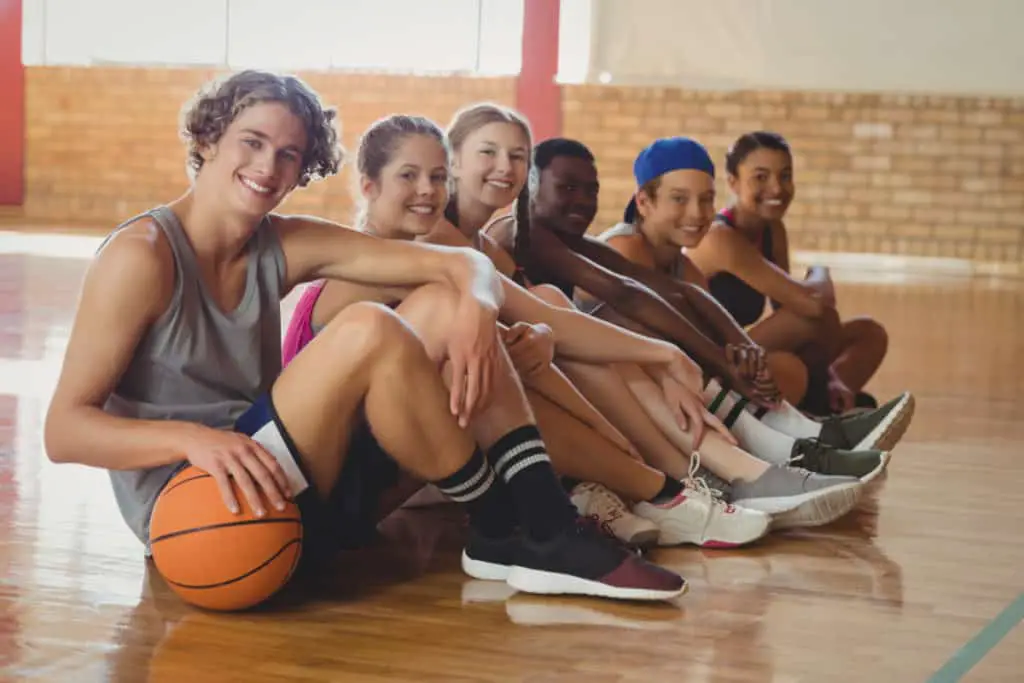Getting kids involved in sports at an early age has become more and more common in the past decade. Drive past any park and you will see kids playing soccer, baseball and even football at a very early age. There are so many great options for kids to be involved in organized sports. These organized opportunities have many benefits for kids.

Why Kids Should Play Sports?
Our number one reason kids should play sports is to develop the interactions that occur with other players and the coaches. Kids learn a great deal of how to be part of a team and do it in a positive manner. This is a lifelong skill that will benefit them in school and eventually the workplace.
We have our 7 Long Terms Reasons Why Kids Should Play Sports.
- Interactions and Relationships
- Team Work
- Fitness
- Communication
- Critical Thinking
- Sportsmanship
- Community
Below we provide our detailed reasons for each of our top 7. There are many positives that come from organized sports and kids seem to love sports and the challenge that comes with competing while having fun.
As someone that has coached youth sports for over 20 years now, I am a firm believer in how many life lessons can be taught through sports. I also realize the negatives of sports and have provided tips at the end of section! Adults make or break youth sports. Play your role in making it a positive!
1 – Interactions and Relationships
Let’s face it, one of the top challenges for many adults in today’s workplace is the interactions and relationships that take place with co workers and the managers. People can be difficult to deal with.
Through organized sports, kids are put in a situation where they are trying to accomplish something as a team. This brings on new challenges. Certain players are asked to play certain roles on a team. This role might not be what a kid wants, but it is best for the team.
Also, there may be someone on the team that a kid doesn’t get along with or is over aggressive. Through working with the parents and the coach the kid can build strategies to help manage the situation with the fellow teammate. This conflict resolution can be a great life lesson and strategies can be used later in life.
One major benefit of organized sports is that kids learn quickly that there are different types of people and personalities. Dealing with these personalities while doing something fun enhances the learning and kids are learning these skills while the focus is on the activity or the game.
Tip: The coach might not always be the most wonderful coach for your team, but kids working through these situations develops tenacity and perseverance and an understanding that things may not always go my way.
2 – Teamwork
Teamwork is a lifelong skill that can be developed at a high level during organized team sports. The opportunity to work together towards a common goal is fantastic.
Kids, through the guidance of the coach, can learn skills such as setting goals a team work, working as a team, winning or losing as a team, and working hard to get better as a team.
During the practice sessions kids are put through different drills that often require them to work with a partner or as a group. These interactions are building the skills of teamwork.
It is wonderful that kids have the opportunity to work together and figure out some situations kid to kid. Parents must be careful of not overstepping their role and letting the coach and assistant coaches guide the kids through the teamwork process. Try to remain positive with your kid and supportive of the coach.
Sports will bring about highs and low. Not every situation will be fantastic with kids eating ice cream after the game celebrating victories. The reality is that during times of defeat is when kids can learn the most. They can learn how to handle emotions, be good sports, and take the feedback from the game and attempt to get better.
Tip: Never talk bad about another kid in front of your own kid. Instead be supportive and encouraging.
3 – Fitness
We have all read about the increase in childhood obesity. It is real and it is a problem. One way to battle childhood obesity is through activities. Sports for kids provides a great opportunity for kids to be active at least several days a week.
While conditioning might not be necessary for the youngest kids, just simply being out on the field running around playing soccer, baseball, football or any other sports the kid is interested in is providing some great opportunities both physically, socially, and emotionally.
Kids need that exercise opportunity and sports provides a great opportunity. Hopefully, the love of the game continues on into high school and then as a adult and participants now have a sport they love that they can play during adulthood to stay healthy and at manageable weight.
Tip: Between practices and games make sure you provide other opportunities to run around and play maybe even with some teammates.
Quick video on the benefits of sports:
4 – Communication
Another lifelong skills develop from organized team sports is communication. Kids learn how to communicate with their teammates and share their frustrations and success with teammates, coaches and parents.
Sports don’t always go the way we want them to, but in a controlled environment, kids can learn how to communicate about their feelings, what they experience and then focus on what is next to get better or to have more fun.
Another excellent opportunity for growth is when a kid doesn’t like his role on a team. The parent should encourage the kid to have a conversation with the coach. This kid to adult interaction will serve the kid well into high school, college and even in the workplace.
Having that uncomfortable conversation and presenting your side is a lifelong skill that many lack today. Instead of turning to social media to blast the coach, the parent should encourage the kid to have a conversation and coach your kid through the conversations.
Depending on the age of the kid, the parent may be present for the conversation, but allow the kid to practice handling that situation and support your kid. The second lesson that comes from this communication is that the kid may not get exactly what they want or hear the answer that they want and that is part of life as well.
Tip: Never blast a coach in front of your kids or say negative things about the coach. It may seem difficult, but there are many benefits of being supportive of the coach.
5 – Critical Thinking
The amount of quick and fast thinking that many sports requires is fantastic for development. Adults must be careful not to yell from the sidelines and try to control every movement that a kid is making.
Part of the development in any sport is the kid learning how to process information, which raises awareness and then respond to what they believe is their next best step. S
ports like soccer and basketball happen quickly and kids must make quick, critical decisions. One of the major benefits is that there is a quick feedback on the decision made by what happens with that play. You will notice that over time, through repetition, kids get better and make better decisions. The skills developed and ability to make the right decision increases.
Tip: Ask your kids about different situations after the game. Have them reflect on why they made certain decisions, but remain positive. Don’t be the critic! Instead, encourage the kid to reflect on the right decision.
6 – Sportsmanship
Learning how to win with class and lose with class is a wonderful life lesson. While winning can be exciting, showing class and respect to your opponent is key.
With the right coach and parent support, kids can learn this needed skill. Parents can play a major role in sportsmanship by how they conduct themselves during the games.
Are the parents the ones yelling at the officials or taunting the other teams? Or are the parents yelling words or encouragement and support for all kids? The role we play as parents is huge and we must be aware of our actions.
When our kids lose, it can be disappointing for all involved. Keeping the game in perspective is key and goes a long way in learning from the loss. A loss is a great opportunity to take in some feedback and talk about ways to get better and improve.
Too often, we can walk away blaming the officials or the coach. The officials made this bad call or the coach should have played this kid more. The conversations we have with kids goes a long way in modeling sportsmanship and helping the kids learn from the experience.
Tip: Be the role model your kid needs for sportsmanship. Leave the field being positive instead of yelling at someone that may have upset you. We have to be careful to manage our emotions…kids are watching!
7 – Community
There are so many great communities across the world. Sports is an excellent opportunity to develop community further and rally round the many great benefits of being part of a community that is supportive of kids. It is encouraging to see the other parents and community members support athletes during the good and bad times.
Kids can also build a sense of community and know that there are adults that will support them in good times and bad times. The connections and relationships that are built with people through all ages during sports can help support your kids as they grow up.
Having these key adults in the life of kids is paramount to their success. The coaches, fans and volunteers can all become a part of kids’ lives in a positive manner.
Tip: Maybe consider having the team become involved in community service. You can support the coach by taking the lead on this opportunity.
The Bottom Line – HAVE FUN!
Regardless of if your kid wins or loses, the bottom line and most important thing is to have fun. Too many can take sports too seriously, instead have fun with the game.
Laugh and joke on the car ride home and point out some positives that your kids did. Have them reflect on the game and experience and share their highs and lows with you. Be supportive in their journey and ultimately encourage hard work, positive relationships and overcoming adversity.
Sports are a phenomenal way for kids to learn many of the life skills and lessons that will set them up for success in their future. Learning the agonizing feeling of defeat and the joys of victory will hopefully encourage and help your kid become a hard work and one that does it for the right reasons…the love of the game!
As someone that has coached youth sports for 20 years and have enjoyed the highs and lows. Youth sports can be amazing, but it all depends on the adults involved. We are encouraging all adults to be the positive role model that kids need!
